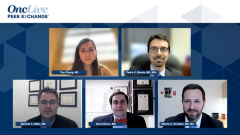
Ongoing Clinical Trials in the Neoadjuvant Setting in RCC
Pedro Barata, MD, MSc, provides a brief overview of ongoing trials in the neoadjuvant setting in patients with RCC.
Episodes in this series

Tian Zhang, MD: Dr Barata, can you provide a brief overview of some ongoing neoadjuvant therapy trials? In particular, we saw some data from one of the first IO [immunotherapy]/VEGF combination trials to report out, avelumab and axitinib, at ASCO GU [American Society of Clinical Oncology Genitourinary Cancers Symposium] last week.
Pedro C. Barata, MD, MSc: Right, great question. We just saw data a couple of days ago literally on NeoAvAx, which is a phase 2 single-arm study of neoadjuvant combination therapy of avelumab with axitinib. They took patients with high-risk clear cell RCC [renal cell carcinoma], and the study involved about 40 patients, and offered them 12 weeks of avelumab and axitinib combination. The primary end point was overall response rate in the primary tumor. What is interesting about this study, as you said, it is one of the first to see data with a combination regimen in this setting, and after a disappointment in general efficacy in the TKI [tyrosine kinase inhibitor] monotherapy setting. It was very interesting to see what these data looked like. Quite interesting, about 30% had a partial response, tumor shrinkage of least of 30% in the primary tumor, and no primary tumor progression while on study. I think the study took about 2 years of follow-up or so. Now, that doesn’t mean systemic response. Of course, in theory, they were all NED, no evidence of disease, they were localized high-risk patients. However, at least 1 patient did progress while on this combination regimen on this 12-week induction. And then, during the 2 years of follow-up, about a third or so did recur, but we don’t have numbers in regard to median disease-free survival or overall survival. Thus, I think it’s going to be important for us to see data with longer follow-up. Nonetheless, I think it’s a very interesting study presented by [Alex] Bex, [MD, PhD,] and colleagues, a very good effort here.
If you’ll allow me, I’d like to highlight the PROSPER study. it’s a very interesting and good effort from the NCI [National Cancer Institute] group, primarily SWOG [Cancer Research Network], but they got help from all cooperative groups, if you will. There were over 760 patients enrolled in this study. Initially the plan was for a longer induction with nivolumab in the short period post-surgery. The patients with high-risk RCC were randomized to either surgery followed by observation or perioperative nivolumab. And as I was saying, initially it was planned for a longer time of neoadjuvant nivolumab, but the study had to be amended to be more feasible, I guess. After that amendment, the updated design for the arm that got nivolumab got 1 dose of nivolumab, surgery, and then 9 doses of nivolumab once a month afterward, for a total of 10 doses of nivolumab. It’s almost an adjuvant nivolumab study against observation, but you do have 1 dose of nivolumab prior. The end point here is event-free survival. The good news is, this study completed accrual several months ago, and now we’ve got to wait for events so that we can see what happens. But I think these studies will add significant information to what we saw with adjuvant pembrolizumab, in my opinion, and what we’re going to see with other checkpoint inhibitors in this setting. Although as I said, this tests the activity in this perioperative setting. Nonetheless, I think it’s a very important study to keep an eye on.
Tian Zhang, MD: Yes, absolutely. I completely agree with you, not only will it add a lot of data about perioperative nivolumab, but also, I think a lot of rich correlatives will be part of the study and understanding the microenvironment in the tumors before and after treatment. These will be key for us to understand this disease and biology of aggressive disease that recurs quickly.
This transcript has been edited for clarity.





































